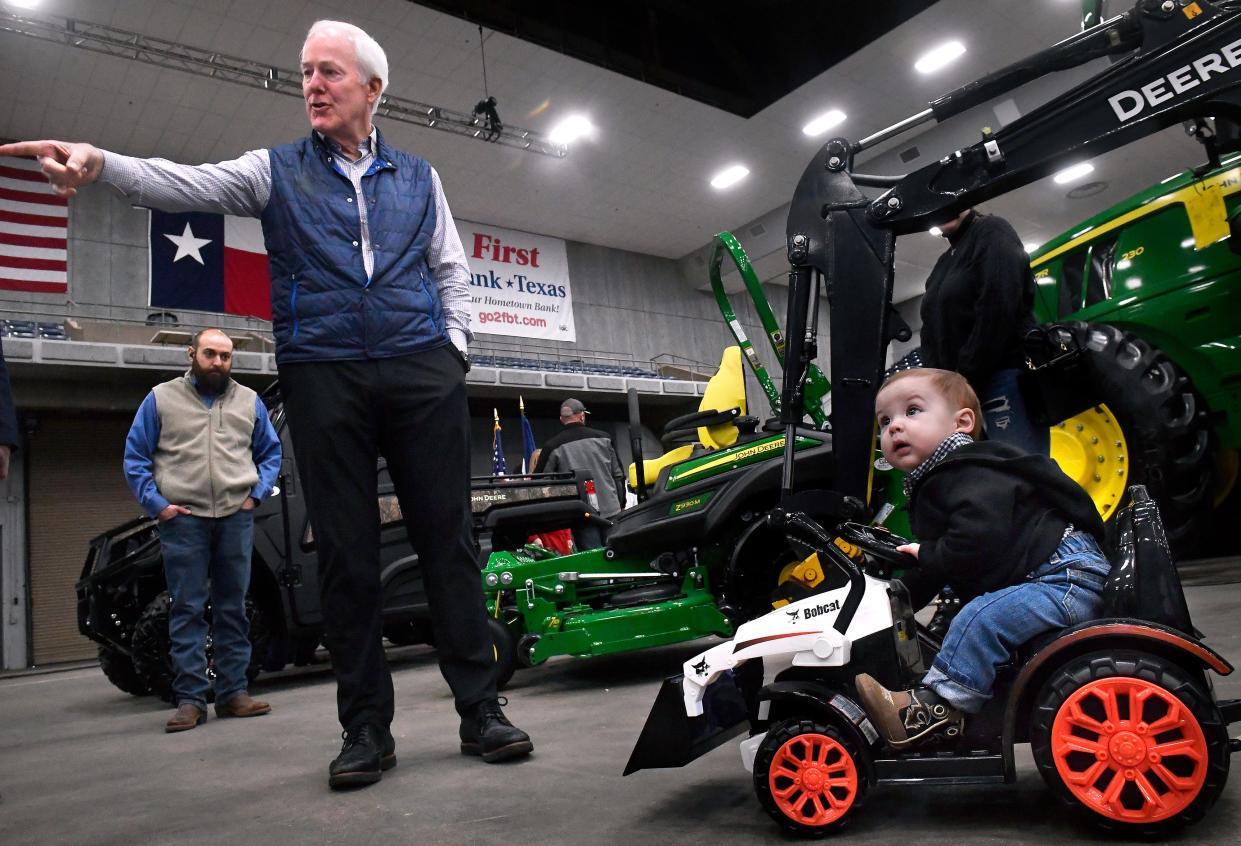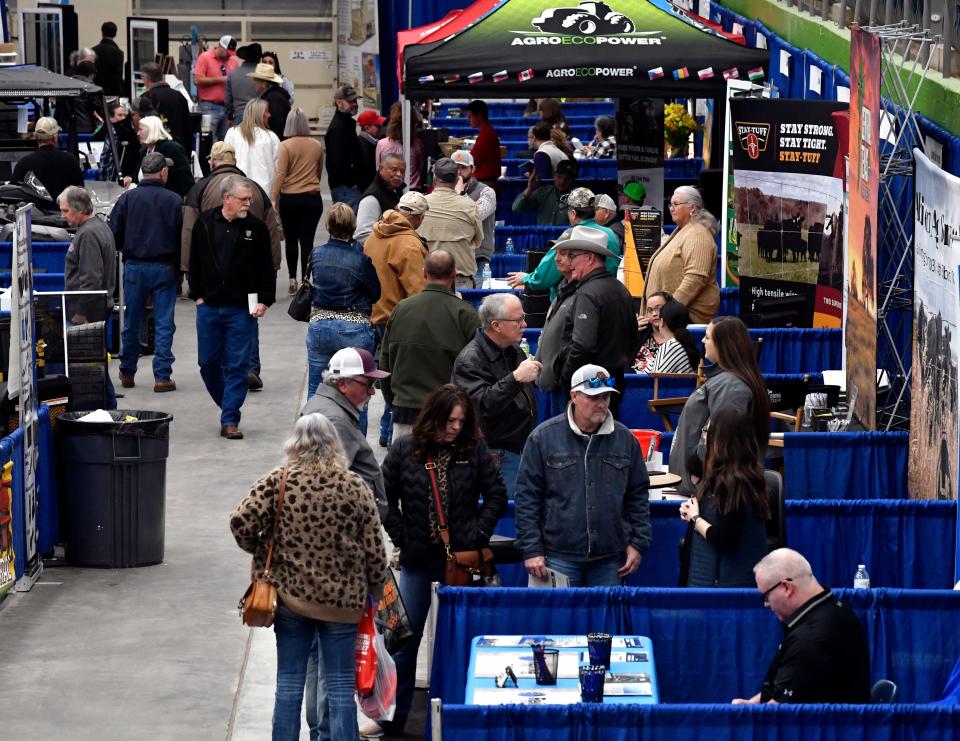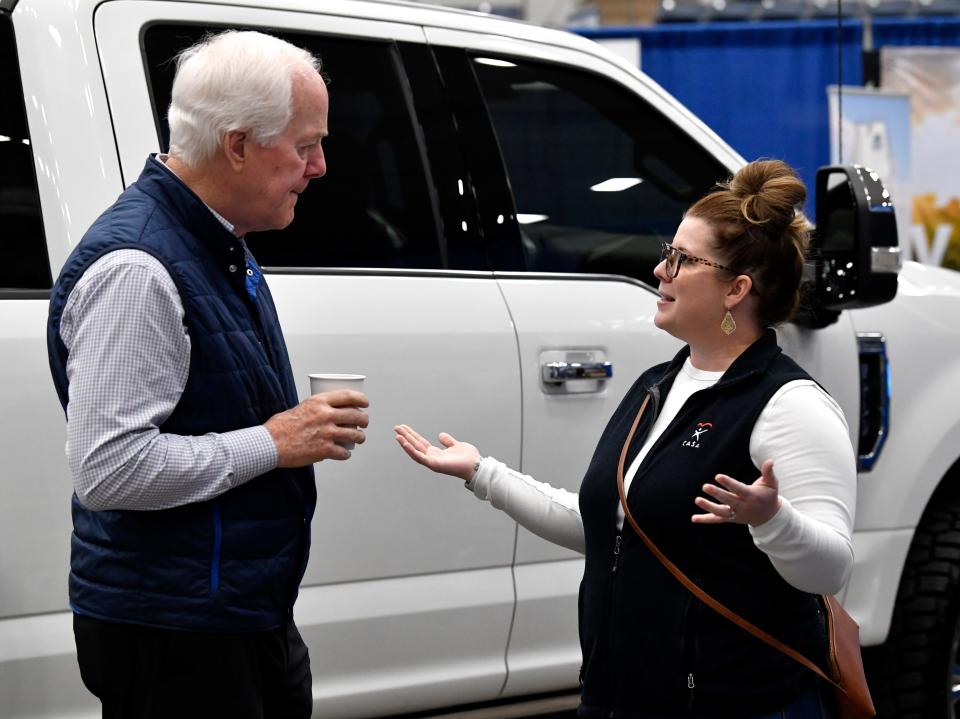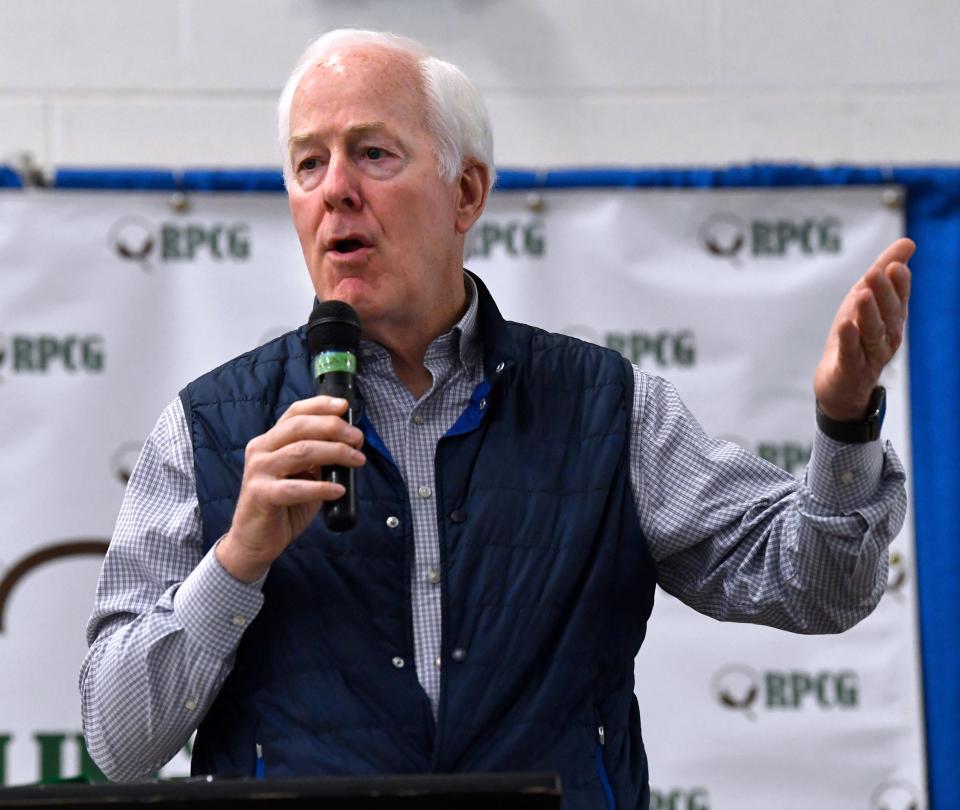Sen. John Cornyn talks cotton, inflation, Russia, China and trade in remarks Tuesday

- Oops!Something went wrong.Please try again later.
The federal government is looking out for cotton growers by "not making their jobs harder," U.S. Sen John Cornyn said in a news conference Tuesday, also tackling Russia, China, inflation and the importance of trade.
In Abilene to speak at the Rolling Plains Cotton Growers' yearly meeting, Cornyn also took a tour of the Texas Farm Ranch Wildlife Expo, both events on the grounds of the Taylor County Expo Center.
Cornyn said it was vital to him to come learn what was on the minds of cotton growers.
"I have to come talk to the experts — or more importantly, listen to the experts," he said.
High cotton
Texas is a critical part of the cotton industry, Cornyn said, and the state is looking for export markets around the world.
Each year, cotton and cotton seed brings about $2.6 billion to the Texas economy.
The U.S. is the world's leading cotton producer, accounting for more than a third of global cotton exports, he said.
"It's core to our state, and there's no part of the state where cotton is more important than this region," he said.
Looking ahead to a future farm bill, Cornyn said he was grateful the most recent version in 2018 returned seed cotton to Title 1 protections, providing a safety net for cotton farmers.
As a temporary mandate, Cornyn worked with fellow members of the Texas delegation to create the Cotton Ginning Cost Share Program, which provided nearly $2.4 billion in direct assistance, he said.
There are many things those in agriculture can't control, Cornyn said, including the weather.
Fortunately, he said, cotton prices are "pretty good now," though input costs continue to go up.
Battling inflation
One of the biggest challenges, not only in agriculture but across the board, is inflation, Cornyn said.
"Part of the problem is this: the federal government's been spending so much money that it's driving the prices for everything up," he said.
During the pandemic, the government had to protect public health and those who needed an economic lifeline, Cornyn said.
Now, the hope is that the country is "coming back into the new normal, where we can just figure out how to deal with this (COVID-19) an as ordinary risk of life," he said.
Government spending drives up prices for everybody, and the pandemic also outed some "vulnerable supply chains," he said.
Cornyn called inflation a "hidden tax."

"Right now, 7.5% inflation means that out of every dollar, 7.5 cents is essentially gone that you used to spend on your on your business or on your family or just in terms of your standard of living," he said. "So, we've got to get that number down."
The Federal Reserve, which has a role to play in terms of setting interest rates, is looking to adopt policies to hopefully attack inflation, he said.
Demand for supply
Speaking about supply chains, Cornyn said he recalled an early conversation with Gov. Greg Abbott about the need for testing and Personal Protection Equipment, or PPE, when the pandemic first hit.
The latter, he said, is mostly made in China, and the state was unable to get as much as it needed, he said.
"Just because it can be made cheaper someplace overseas, it doesn't necessarily mean that it's a dependable supply chain," he said.
That's a lesson also inherent in demand for semiconductors, used in manifold technological devices from cameras to cars.
That need also highlights potential vulnerabilities, he said, in areas such as the automotive industry, which has been unable to meet recent demand.
The Asian market commands 90% of the semiconductor industry, with 60% made in Taiwan, Cornyn said.
"It doesn't take a lot of imagination to see where another pandemic or a natural disaster, or ... even a military conflict, if China decides to take Taiwan, would disrupt our supply," Cornyn said.
With "everything with an off and on switch" relying on them, "that's just another example of why we need to do more manufacturing here in the United States" to reduce such vulnerabilities, he said.

Eye on Russia
Speaking on the potential invasion of Ukraine by Russia, Cornyn said he recalled a debate between President Barack Obama and Sen. Mitt Romney.
Romey argued that the prime threat to the United States was Russia, while Obama took a different tack, citing the end of the Cold War.
But "here we are, worrying about Russia invading Ukraine and threatening NATO," Cornyn said.
NATO was built as a hedge against another world war, he said.
"We had two world wars in Europe, and obviously, we want to avoid another one," he said.
But Vladimir Putin said the fall of the Soviet Union was the single biggest geopolitical tragedy of the last century, "and he's determined to rebuild it," Cornyn said.
"Weakness on our part," such as the way President Biden pulled troops out of Afghanistan, encourage Putin, he said.
"We didn't talk to our NATO partners, we didn't really communicate with anybody," Cornyn said. "He just shut her down and left a lot of Americans stranded in the process. So Putin looks for opportunities, and when he sees weakness, that really is a provocation."
China trade
But Putin is not the only geopolitical threat, Cornyn said.
China's President Xi "wants to unify China by taking Taiwan," he said, currently a thriving democracy.
"If we're going to keep the peace, or if we're going to avoid war, we've got to stay strong," he said. "We've got to be such a threat to these authoritarian countries that they don't want to pick a fight."
Cornyn said one of the biggest mistakes made in trade was been "turning our back on the Trans-Pacific Partnership."
"The one thing we have, particularly in Asia, is friends," he said. "We have allies, and we're all concerned about the common threat of China."

More and more, Cornyn said, the Biden administration's biggest priority is protecting labor unions, and "labor unions don't like trade agreements."
"But these trade agreements, I think, are a way for us to leverage the fact that we do have friends and allies against the common threats of countries like China," he said. "So, I'm going to continue to push them to reenter or to reexamine the possibility of reentering those multilateral trade agreements, like the Trans Pacific Partnership."
Brian Bethel covers city and county government and general news for the Abilene Reporter-News. If you appreciate locally driven news, you can support local journalists with a digital subscription to ReporterNews.com.
This article originally appeared on Abilene Reporter-News: Sen. John Cornyn speaks on cotton, inflation, Russia, China and trade

